|
|
|
Sort Order |
|
|
|
Items / Page
|
|
|
|
|
|
|
| Srl | Item |
| 1 |
ID:
111690
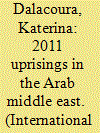

|
|
|
|
|
| Publication |
2012.
|
| Summary/Abstract |
The Arab uprisings of 2011 are still unfolding, but we can already discern patterns of their effects on the Middle East region. This article offers a brief chronology of events, highlighting their inter-connections but also their very diverse origins, trajectories and outcomes. It discusses the economic and political grievances at the root of the uprisings and assesses the degree to which widespread popular mobilization can be attributed to pre-existing political, labour and civil society activism, and social media. It argues that the uprisings' success in overthrowing incumbent regimes depended on the latter's responses and relationships with the army and security services. The rebellions' inclusiveness or lack thereof was also a crucial factor. The article discusses the prospects of democracy in the Arab world following the 2011 events and finds that they are very mixed: while Tunisia, at one end, is on track to achieve positive political reform, Syria, Yemen and Libya are experiencing profound internal division and conflict. In Bahrain the uprising was repressed. In Egypt, which epitomizes many regional trends, change will be limited but, for that reason, possibly more long-lasting. Islamist movements did not lead the uprisings but will benefit from them politically even though, in the long run, political participation may lead to their decline. Finally, the article sketches the varied and ongoing geopolitical implications of the uprisings for Turkish, Iranian and Israeli interests and policies. It assesses Barack Obama's response to the 2011 events and suggests that, despite their profound significance for the politics of the region, they may not alter the main contours of US foreign policy in the Middle East in a major way.
|
|
|
|
|
|
|
|
|
|
|
|
|
|
|
|
| 2 |
ID:
103423
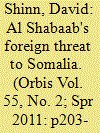

|
|
|
|
|
| Publication |
2011.
|
| Summary/Abstract |
This article focuses on the threat to Somalia by al Shabaab (The Youth), an extremist organization that controls most of southern and central Somalia. It learned its strategy and tactics from al Qaeda and the Taliban and relies heavily on a relatively small number of foreign fighters, most of whom are Somalis with foreign passports from the large Somali diaspora. The non-Somali contingent probably numbers only about 200 to 300, although it brings battlefield experience from Afghanistan and Iraq and provides al Shabaab with expertise in bomb making, remote-controlled explosions, suicide bombing and assassinations. Some of the foreigners occupy key positions in al Shabaab. The connection between al Shabaab and al Qaeda is growing stronger but has not yet reached the level of operational control by al Qaeda. Al Shabaab's draconian tactics, which are imported from outside and are anathema to most Somalis, and its foreign component may be its undoing.
|
|
|
|
|
|
|
|
|
|
|
|
|
|
|
|
| 3 |
ID:
101801
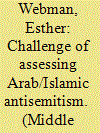

|
|
|
|
|
| Publication |
2010.
|
| Summary/Abstract |
The object of this article is to introduce a careful reading of Arab/Islamic anti-Semitism in view of the conflicting approaches to its assessment. Three aspects are covered: the origins of this anti-Semitism and its relation to the Arab-Israeli conflict; the impact of Nazism on Arab/Islamic anti-Semitism; and the place of anti-Semitism in the ideology of Islamist movements, highlighting a much neglected feature - the Arab discourse on Arab/Islamic anti-Semitism. It contends that the image of the Jew as an irredeemably destructive, conspiratorial agent, hostile not only to Arabs and Muslims but to humanity at large, is a relatively new phenomenon, gradually striking roots especially among Islamists.
|
|
|
|
|
|
|
|
|
|
|
|
|
|
|
|
| 4 |
ID:
121071
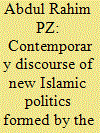

|
|
|
|
|
| Publication |
2013.
|
| Summary/Abstract |
The 2011 popular Arab uprising in West Asia and North Africa has been totally changed the existing perceptions and opinions on the Arabs. Arab uprisings were happened because of the three main deficits. They were economic, political and dignity deficits respectively. Political Islam, Islamist Movements, and new Islamic politics were also discussed rather than before. The political thoughts of classical Islamist Intellectuals like Sayyid Qutub, Hasan al Banna and Abul A'ala Moududi have been modified as per the new Islamic political thoughts of Rashid Al Gannouchi and the practical models of Racep Tayyib Erdogan. Definitions of the Europian secularism and democracy changed.
|
|
|
|
|
|
|
|
|
|
|
|
|
|
|
|
| 5 |
ID:
097790
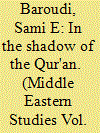

|
|
|
|
|
| Publication |
2010.
|
| Summary/Abstract |
Academics have paid far more attention to Islamist movements than to the political discourse of contemporary Islamist authors. This is regrettable for four main reasons. First, Islamists address issues of major importance to their societies and these societies' relations with the external world, especially the West. Understanding their discourse holds the key to a better understanding of Islamist movements. Second, Islamists form an integral component of the Arab intelligentsia. As opinion shapers they influence the attitudes, beliefs and value systems of Arab publics. Third, Islamists have been writing extensively and critically about the United States, especially since the end of the Cold War. It is of great importance to understand why they are so 'preoccupied' with America and why they view it the way they do. Finally, Islamists write in a distinct style that leans heavily, and in complex ways, on the sacred text (the Qur'an). It is intriguing and intellectually stimulating to analyze the substance and style of their discourse and to contextualize it historically. This article focuses on one specific and critical aspect of contemporary Islamist discourse: its treatment of the United States.
|
|
|
|
|
|
|
|
|
|
|
|
|
|
|
|
| 6 |
ID:
089859
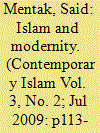

|
|
|
| 7 |
ID:
096557
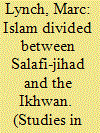

|
|
|
|
|
| Publication |
2010.
|
| Summary/Abstract |
The Muslim Brotherhood poses a unique challenge to efforts to combat Al Qaeda and like-minded groups. It is one of the key sources of Islamist thought and political activism, and plays a significant role in shaping the political and cultural environment in an Islamist direction. At the same time, it opposes Al Qaeda for ideological, organizational, and political reasons and represents one of the major challenges to the salafi-jihadist movement globally. This dual nature of the Muslim Brotherhood has long posed a difficult challenge to efforts to combat violent extremism. Does its non-violent Islamism represent a solution, by capturing Islamists within a relatively moderate organization and stopping their further radicalization (a "firewall"), or is it part of the problem, a "conveyor belt" towards extremism? This article surveys the differences between the two approaches, including their views of an Islamic state, democracy, violence, and takfir, and the significant escalation of those tensions in recent years. It concludes that the MB should be allowed to wage its battles against extremist challengers, but should not be misunderstood as a liberal organization or supported in a short-term convergence of interests.
|
|
|
|
|
|
|
|
|
|
|
|
|
|
|
|
| 8 |
ID:
110319
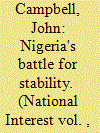

|
|
|
|
|
| Publication |
2012.
|
| Summary/Abstract |
RECENT EVENTS in Nigeria, including its presidential elections last April, have produced two narratives on the current state of that oil-rich West African nation with a history of civic turmoil. The first is that events there have unfolded rather favorably since its elected president, Umaru Yar'Adua, fell ill in late 2009 and the country was left leaderless. That raised fears of a military coup, but then Goodluck Jonathan emerged to fill the power vacuum, first as an extraconstitutional "acting president," then as a constitutional successor after Yar'Adua's death and finally as the elected executive following the 2011 elections. This optimistic narrative notes that those elections were praised by international observers as better than in the past-and hence they reflected the will of the national majority. An amnesty for militants in the oil-rich Niger Delta, combined with disarmament, training and reintegration, ended a long insurrection there. One serious specter, however, still haunts the country-the expansion of the Islamic "terrorist group" Boko Haram, with its global connections. Hence, Nigeria's security challenge has become internationalized, and Westerners grappling with Islamist movements need to keep a sharp eye on that situation.
|
|
|
|
|
|
|
|
|
|
|
|
|
|
|
|
| 9 |
ID:
165989
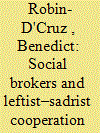

|
|
|
|
|
| Summary/Abstract |
This article develops a concept of social brokerage to explain leftist–Sadrist cooperation during Iraq's 2015 protest movement. Conventional understanding holds that Iraq's secular-leftist civil trend and Shiʿi Islamist factions have been mutually isolated, and at times fierce antagonists, in Iraq's post-2003 politics. This view has been challenged by an emergent political alliance between a faction of the civil trend and the Shiʿi Islamist Sadrist movement. By comparing this alliance with the failure of another Shiʿi Islamist group, ʿAsaʾib Ahl al-Haq, to involve itself with and exploit the protest movement, this article isolates the conditions which determined the dynamics of leftist–Islamist interactions. Shifting the focus away from elite politics and structural-instrumental explanations favored by rational choice models, this article reveals a longer backstory of social and ideological interactions between less senior actors that transgressed leftist–Islamist social boundaries. From this context, potential brokers emerged, capable of skilfully mediating leftist–Sadrist interactions.
|
|
|
|
|
|
|
|
|
|
|
|
|
|
|
|
| 10 |
ID:
148226
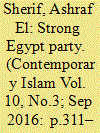

|
|
|
|
|
| Summary/Abstract |
Islamist parties espouse a socio-political platform that rests on the notion of creating an Islamic order and the application of the Islamic Sharia as a normative/legal and authoritative power structure. Progressive/Democratic Islamists is a term coined by some scholars to account for the emergence of new actors within the Islamic ranks starting from the 1990s in several Middle Eastern countries including Iran, Turkey, Egypt and North African countries. These actors depart from authoritarian political interpretations of Islamic texts, calling for a rationalist interpretation of Islamic idioms emphasizing the compatibility of Islam with democracy, pluralism, human rights and grassroots empowerment. This article analyzes the case of the Strong Egypt party (SEP) in the wake of the 2011 uprising in Egypt. It problematizes the identity of the party and its location in the ideological and political spectrum in Egypt. The article argues that the SEP claims a mixture of cultural conservatism, economic progressivism and political democracy, but that this mixture suffers from lack of depth, sophistication and a genuine social constituency and project.
|
|
|
|
|
|
|
|
|
|
|
|
|
|
|
|
| 11 |
ID:
116338
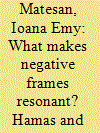

|
|
|
|
|
| Publication |
2012.
|
| Summary/Abstract |
Increasingly, scholars are applying Social Movement Theory to explore how radical Islamist groups strategically employ framing to legitimize the use of violence. What has not been explicitly examined, however, is under what conditions radical frames are more resonant with the public than more moderate alternatives. This article argues that the strength of a particular frame depends on the credibility of the competing claim-makers. Drawing on public opinion polls from the Palestinian Territories, the article shows that the resonance of Hamas' frames vis-à-vis the peace process between 1993 and 2006 depended on the ability of the Palestinian leadership to maintain its legitimacy. Since the Gaza take-over and Hamas' shift to a position of leadership rather than opposition party, the organization's inability to deliver in the economic realm or to even feign any progress regarding the peace process damaged its credibility and reputation. Accordingly, its frames vis-à-vis the peace process also started losing their resonance with the public. An understanding of the dynamics of credibility can also help explain the continued moves towards national reconciliation between Hamas and Fatah.
|
|
|
|
|
|
|
|
|
|
|
|
|
|
|
|
|
|
|
|
|